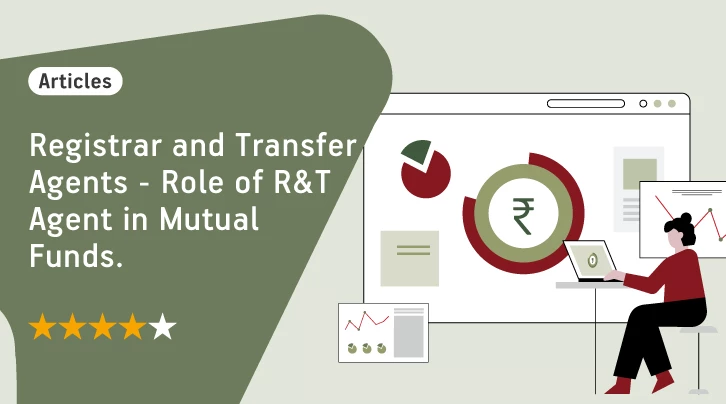RTAs or Registrar and Transfer Agents are essential to the operation of mutual funds. They are organisations with Securities and Exchange Board of India (SEBI) registrations offering critical administrative and record-keeping services to mutual fund firms.
RTAs serve as a middleman between investors and mutual fund companies, guaranteeing effective handling of investor-related transactions and efficient operations. They keep complete records of mutual fund investors, including their contact and personal information. The processing of investor transactions, creating account statements, managing changes to investor information, and managing the transfer of ownership of mutual fund units are just a few of the many activities that RTAs facilitate.
RTAs are advantageous to investors because they provide a single point of access to all information pertaining to their mutual fund assets. RTAs have played a crucial role in refining and streamlining the investor experience within the mutual fund business thanks to their extensive network across the nation and the introduction of online services.
Continue reading to discover more about the significant role played by RTAs in the context of mutual funds.
What is RTA (Register and Transfer Agents) in Mutual Funds?
RTA stands for Registrar and Transfer Agents, firms registered with SEBI (Securities and Exchange Board of India). Their primary function is to facilitate record maintenance for mutual fund companies, acting as a convenient single-window reference for investors. This allows investors to access all mutual fund investment-related information from RTAs.
In the role of mediator or agent between investors and mutual fund houses, RTAs are hired by financial institutions to manage and maintain proper records of investor data. This includes crucial information such as account balances and transactions.
In India, some of the RTA companies are SAG RTA, 3i Infotech Ltd., CAMS (Computer Age Management Services), and Karvy. These companies offer RTA services to financial institutions, mutual fund companies, and investors.
Role of a Registrar and Transfer Agent (RTA) in Mutual Fund?
A registrar is a company responsible for maintaining the records of mutual fund investors, including their personal and contact details. They handle record updates, issue and dispatch account statements, and process transactions for investors.
On the other hand, a transfer agent is a company that manages the transfer of ownership of mutual fund units. They maintain ownership records of mutual fund units, handle issues and redemptions of units, and update investor ownership records when ownership transfer occurs.
Registrar and share transfer agent tracks various investor transactions in mutual funds, such as buying, redeeming, switching, updating personal information, and more. They possess professional expertise in maintaining investor and Asset Management Company (AMC) data. Investors can conveniently find all their transactions consolidated under one organisation, even if they have invested with multiple AMCs.
RTAs have a widespread network across the country, and with the advent of online services and investing, investors can access RTA services from anywhere in the country.
Services Offered by Registrar and Transfer Agents
The services offered by a Registrar and share transfer agent is as follows:
Services to AMC
When it comes to services, RTAs and asset management companies divide responsibilities for compliance, risk management, sales, and marketing. RTAs primarily focus on operations, investor services, and distribution services.
Asset management companies utilise RTAs to maintain their records. The specific RTA used depends on the AMC to which the individual's folio is assigned and the fund in which they have invested.
Services to Mutual Fund Investors
Here are some instances showcasing the roles of register and transfer agent for investors:
Transactions and Investments: Investors can carry out transactions with mutual fund companies registered with RTAs using the platforms available on their system. Through these channels, they can also invest in New Fund Offers (NFOs).
Statement Generation: An R&T agent creates various types of statements that provide valuable insights into the mutual fund portfolio. Investors can access a Consolidated Account Statement (CAS) that displays all their mutual fund holdings across multiple AMCs.
Additionally, unique statements specific to mutual fund businesses registered with the RTA will also be generated.
Services to AIF Investors
Most RTAs offer AIFs (Alternative Investment Funds) and PMS (Portfolio Management Service) services. Here is a list of the services they provide:
In simple terms, AIFs are privately pooled investment vehicles designed to function as funds. They primarily collect funds from sophisticated foreign and Indian investors and are regulated by the Securities and Exchange Board of India (SEBI). AIFs are tailored for educated and seasoned investors, given the complex investment techniques, associated risks, and higher minimum investment requirements. They are typically structured as limited liability partnerships (LLPs).
On the other hand, PMS (Portfolio Management Service) operates similarly to a mutual fund but with a crucial difference. PMS offers a customised portfolio of stocks, allowing investors to own individual stocks directly. In contrast, mutual funds represent a portfolio of stocks through units. With PMS, investors have more control over stock weightage decisions.
This post summarises everything related to RTAs, covering their roles, services to mutual fund investors, AIF investors, and more.
Summing up
Mutual fund investments are steadily gaining popularity and becoming a mainstream practice. The rise of convenient online investing has led to an influx of investor transactions. This surge may involve new investors entering the industry, increased transactions by existing investors, or even the opposite scenario. Despite the direction, the mutual fund industry is witnessing heightened activity and is expected to continue growing in the upcoming years.
Given this scenario, managing, and maintaining a vast database of millions of investors would become arduous for mutual fund houses. This is where an RTA comes into play, as the AMC entrusts the register and transfer agent with this crucial responsibility.
Mutual Fund investments are subject to market risks, read all scheme related documents carefully.






 1800-270-7000
1800-270-7000




